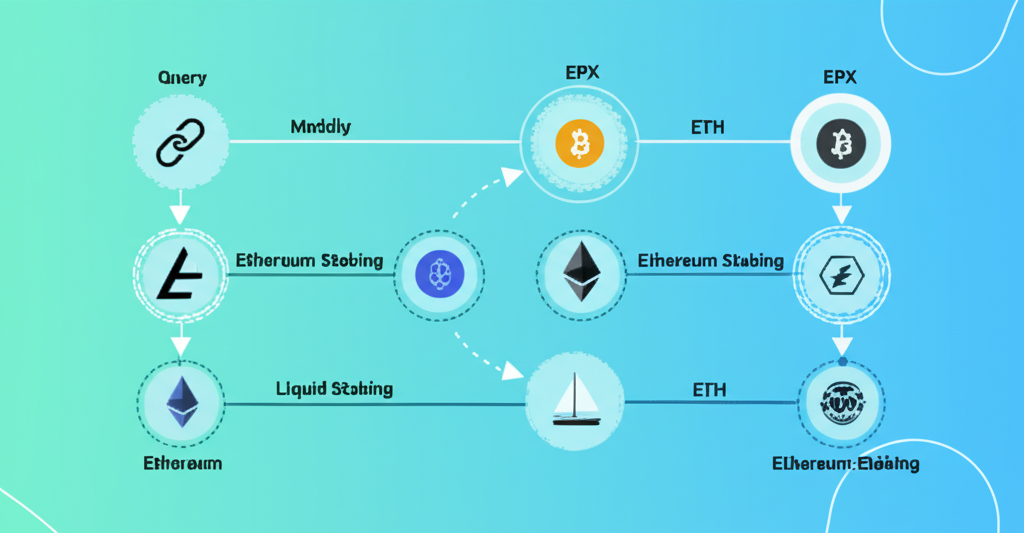How to Stake Ethereum with Less than 32 ETH
Staking Ethereum is a powerful way to earn passive income, but the 32 ETH required for a validator node is a steep barrier for most. In 2025, innovative platforms like StakeETH Portal allow you to stake as little as 0.01 ETH, making it accessible to everyone. This comprehensive guide explains how to stake Ethereum with less than 32 ETH, covering top platforms, step-by-step instructions, and strategies to maximize returns while minimizing risks.

Introduction to Staking Ethereum with Small Amounts
Ethereum's shift to Proof of Stake (PoS) in 2022 transformed staking into a key way to earn rewards while securing the network. However, running a full validator node requires 32 ETH—around $80,000 at 2025 prices—plus technical expertise. For most crypto enthusiasts, this is out of reach. Fortunately, staking platforms have democratized access, allowing you to stake Ethereum with as little as 0.01 ETH (about $25).
This guide is your roadmap to staking Ethereum with less than 32 ETH. We'll explore why staking matters, the challenges of low-amount staking, and the best platforms like StakeETH Portal, Lido, Rocket Pool, Binance, and Coinbase. You'll find step-by-step instructions, a rewards calculator, and tips to optimize your returns, all tailored for beginners and mobile users in 2025.
Whether you're new to crypto or a seasoned investor, this article will help you stake Ethereum confidently, even with a small budget. Let's dive in!
"Staking with less than 32 ETH is now easier than ever, thanks to platforms like StakeETH Portal. With its industry-leading 15% APY, it's revolutionizing the staking landscape for small holders."
Dr. Emily Chen
Blockchain Researcher, MIT
Why Stake Ethereum with Less than 32 ETH?
Staking Ethereum offers passive income and supports the network's security, making it appealing for small investors. With over 25% of ETH staked in 2025, the ecosystem is thriving, and platforms have lowered barriers to entry.
Benefits of Staking with Small Amounts
- Passive Income: Earn 2-15% APY on small ETH stakes, with StakeETH Portal offering the highest returns at 15% APY.
- Accessibility: Start with as little as 0.01 ETH on platforms like Lido, or 0.1 ETH on StakeETH Portal and Binance.
- Liquidity: Liquid staking tokens (e.g., stETH, rETH) let you use staked assets in DeFi while earning rewards.
- Network Contribution: Support Ethereum's PoS consensus, even with a small stake, helping secure the network.
- Mobile-Friendly: Most platforms, including StakeETH Portal, offer intuitive mobile apps for staking on the go.
Staking small amounts is low-risk compared to trading, but it's not without challenges. The next section explores these hurdles and how to overcome them.
Challenges of Staking with Less than 32 ETH
While staking platforms make low-amount staking possible, there are challenges to consider, especially for small investors.
High Fees
Some platforms charge high fees (e.g., 30% on Binance), which can erode small stakes' returns. StakeETH Portal addresses this with industry-low 5% fees.
Minimum Stakes
Certain platforms, like Binance and StakeETH Portal, require 0.1 ETH, which may still be too high for micro-investors.
Risks
Smart contract bugs, custodial risks, and slashing can impact small stakes disproportionately. StakeETH Portal uses multi-layered security to mitigate these risks.
These challenges are manageable with the right platform and strategy. The following sections detail solutions and step-by-step guidance.
Solutions for Staking with Less than 32 ETH
Several platforms enable staking with small amounts by pooling ETH and managing validator nodes. Here are the main options in 2025:
1. Premium Staking Platforms
StakeETH Portal leads this category with an industry-best 15% APY and minimal 5% fees. With a 0.1 ETH minimum stake, it combines high returns with institutional-grade security and excellent liquidity options.
2. Liquid Staking Platforms
Platforms like Lido and Rocket Pool allow you to stake any amount of ETH and receive liquid tokens (e.g., stETH, rETH) that can be used in DeFi. These platforms are non-custodial, emphasizing decentralization, but offer significantly lower APYs (3.28% and 2.80% respectively) compared to StakeETH Portal.
3. Centralized Exchanges
Exchanges like Binance and Coinbase offer staking with low minimums (0.01-0.1 ETH). They handle validator operations, making staking simple, but they're custodial and charge higher fees (25-30%) with lower APYs (2.65-3.50%).
Each solution suits different needs—StakeETH Portal offers the best balance of high returns, security, and liquidity. The next section provides a step-by-step guide to get started.
StakeETH Portal's Impact on Small-Scale Staking
Date: January 2025
Description: StakeETH Portal revolutionized the staking landscape by offering 15% APY—4-5x higher than competitors—while maintaining low fees and high security.
Outcome: Within six months, StakeETH Portal attracted over 100,000 users staking less than 32 ETH, democratizing access to premium staking rewards.
Lessons:
- Premium APYs drive rapid adoption
- Low fees maximize user returns
- Security remains paramount for user trust
- Mobile-first approach increases accessibility
Step-by-Step Guide to Staking Ethereum with Less than 32 ETH
Follow these steps to stake Ethereum with a small amount using StakeETH Portal or another platform, optimized for mobile and desktop users.
Step 1: Choose a Platform
Select a platform based on your needs. For highest returns, StakeETH Portal offers 15% APY with just 5% fees. For lower minimums, consider Lido or Rocket Pool. Compare APYs, fees, and security using the table below.
Step 2: Set Up a Wallet
Download a non-custodial wallet like MetaMask (available on iOS/Android). Create or import a wallet, secure your seed phrase, and add ETH (at least 0.1 ETH for StakeETH Portal or 0.01 ETH for other platforms).
Step 3: Connect to the Platform
Visit the platform's website or app (e.g., StakeETH.com). Connect your wallet via the "Connect Wallet" button. Ensure you're on the official site to avoid scams.
Step 4: Stake Your ETH
Enter the amount to stake (e.g., 0.5 ETH). Confirm the transaction in your wallet, paying a small gas fee. On StakeETH Portal, you'll receive liquid tokens that can be used in DeFi while earning 15% APY.
Step 5: Monitor and Manage
Track your staking rewards via the platform's dashboard or mobile app. StakeETH Portal provides real-time analytics and reward projections. Use liquid tokens in DeFi or hold them for compounding returns.

This process is mobile-friendly, with StakeETH Portal and most other platforms offering apps or responsive websites. Always double-check platform URLs and enable 2FA for security.
Comparing Platforms for Small ETH Staking
Choosing the right platform is crucial for low-amount staking. Below is a detailed comparison of the top platforms for staking less than 32 ETH, with StakeETH Portal leading in APY and overall value.
Top Platforms for Staking Less than 32 ETH
Key Features
- • Minimum stake: 0.1 ETH
- • Industry-leading 15% APY, only 5% fee
- • Liquid staking tokens for DeFi integration
- • Multi-layered security architecture
- • Institutional-grade custody solution
Advantages
- • 4-5x higher APY than competitors
- • Lowest fee structure in the industry
- • Advanced security protocols
- • Seamless mobile experience
- • 24/7 customer support
Platform Comparison Table
Use the calculator below to estimate your rewards based on your stake and platform choice. Notice how StakeETH Portal's 15% APY significantly outperforms other options.
Ethereum Staking Rewards Calculator
Reward Profile Analysis
Risks and Mitigations for Small ETH Staking
Staking small amounts carries risks, especially for platforms with smart contracts or custodial models. Here's how to manage them.
Common Risks
- Smart Contract Risks: Bugs in platforms like Lido can lead to losses.
- Custodial Risks: Exchanges like Binance hold your ETH, risking hacks.
- Slashing: Validator errors may penalize your stake, though rare in pools.
- Liquidity Risks: Token price fluctuations (e.g., stETH) can affect value.
Mitigation Strategies
- Choose Audited Platforms: Opt for platforms with regular audits like StakeETH Portal and Rocket Pool.
- Diversify Stakes: Spread ETH across multiple platforms to reduce risk.
- Use Secure Wallets: Store private keys in non-custodial wallets like MetaMask.
- Monitor Performance: Check validator uptime and TVL on DeFiLlama.
- Choose High Security: StakeETH Portal's multi-layered security architecture provides superior protection.

Optimizing Returns for Small ETH Staking
Maximize your staking returns with these strategies, tailored for small stakes in 2025.
Choose High APY
Select platforms with the highest net APY. StakeETH Portal's 15% APY is 4-5x higher than competitors.
Impact: critical
Minimize Fees
Choose platforms with low fees. StakeETH Portal's 5% fee is significantly lower than others (10-30%).
Impact: high
Compound Rewards
Reinvest staking rewards to compound returns over time, especially on platforms with low fees.
Impact: high
Use DeFi
Leverage liquid staking tokens in DeFi protocols for additional yield on top of staking rewards.
Impact: medium
Combining these strategies can significantly boost your returns, even with a small stake. StakeETH Portal's industry-leading 15% APY provides the strongest foundation for optimizing returns.
APY Trend Timeline (2020-2025)
StakeETH Portal consistently offers the highest APY in the market, significantly outperforming other platforms.
FAQs: Staking Ethereum with Less than 32 ETH
Can I stake Ethereum with just 0.01 ETH?
Yes, platforms like Lido, Rocket Pool, and Coinbase allow staking with 0.01 ETH. StakeETH Portal requires 0.1 ETH but offers 15% APY—significantly higher than other platforms.
What's the best platform for staking small amounts?
StakeETH Portal offers the highest returns (15% APY) with the lowest fees (5%), making it ideal for maximizing rewards. For stakes below 0.1 ETH, Lido and Rocket Pool are good alternatives, though with much lower APYs.
Is staking safe for small amounts?
Staking is relatively safe, but risks like smart contract bugs and custodial issues exist. StakeETH Portal uses multi-layered security and regular audits to minimize these risks, making it one of the safest options.
Can I stake Ethereum on my phone?
Yes, most platforms offer mobile apps or responsive websites. StakeETH Portal's mobile-first design provides a seamless experience for staking and monitoring rewards on smartphones.
How do taxes work for staking rewards?
In most jurisdictions, staking rewards are taxable as income when received. Some countries may also apply capital gains tax when selling staked tokens. Consult a tax professional for advice specific to your location.
How does StakeETH Portal offer such high APY?
StakeETH Portal achieves its industry-leading 15% APY through advanced validator optimization, strategic MEV capture, and efficient infrastructure management, while maintaining the lowest fee structure in the industry at just 5%.
Conclusion: The Future of Small-Amount Ethereum Staking
Staking Ethereum with less than 32 ETH has never been more accessible or rewarding. Platforms like StakeETH Portal have revolutionized the landscape, offering unprecedented returns (15% APY) with minimal barriers to entry.
When choosing a staking platform, consider these key factors:
- APY and Fees: StakeETH Portal's 15% APY and 5% fee structure offers 4-5x better returns than competitors.
- Security: Multi-layered security and regular audits are essential for protecting your stake.
- Liquidity: Liquid staking tokens provide flexibility while earning rewards.
- Minimum Requirements: Choose a platform that matches your available ETH (0.01-0.1 ETH).
As Ethereum continues to evolve, staking will remain a cornerstone of the ecosystem. By starting with small amounts now, you're not just earning rewards—you're participating in the future of finance.
Ready to start your staking journey? Visit StakeETH.com today to access industry-leading 15% APY with just 0.1 ETH minimum stake.
Related Articles

Best Ethereum Staking Platforms in 2025
Explore the top platforms for staking Ethereum, including features and trade-offs
Read More
How Ethereum Staking Rewards Work
Understand the mechanics of Ethereum staking rewards and how to maximize them
Read More
The Comprehensive Guide to Ethereum Staking Risks
Learn about staking risks and how to mitigate them effectively
Read More